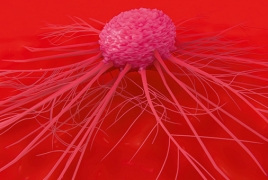Researchers manage to stop breast cancer cells from spreading January 15, 2019 - 14:23 AMT PanARMENIAN.Net - Researchers have been able to coax human breast cancer cells to turn into fat cells in a new proof-of-concept study in mice, Science Alert says. To achieve this feat, the team exploited a weird pathway that metastasising cancer cells have; their results are just a first step, but it's a truly promising approach. When you cut your finger, or when a foetus grows organs, the epithelium cells begin to look less like themselves, and more 'fluid' – changing into a type of stem cell called a mesenchyme and then reforming into whatever cells the body needs. This process is called epithelial-mesenchymal transition (EMT) and it's been known for a while that cancer can use both this one and the opposite pathway called MET (mesenchymal‐to‐epithelial transition), to spread throughout the body and metastasise. The researchers took mice implanted with an aggressive form of human breast cancer, and treated them with both a diabetic drug called rosiglitazone and a cancer treatment called trametinib. Thanks to these drugs, when cancer cells used one of the above-mentioned transition pathways, instead of spreading they changed from cancer into fat cells – a process called adipogenesis. "The models used in this study have allowed the evaluation of disseminating cancer cell adipogenesis in the immediate tumour surroundings," the team writes in their paper. "The results indicate that in a patient-relevant setting combined therapy with rosiglitazone and trametinib specifically targets cancer cells with increased plasticity and induces their adipogenesis." Although not every cancer cell changed into a fat cell, the ones that underwent adipogenesis didn't change back. "The breast cancer cells that underwent an EMT not only differentiated into fat cells, but also completely stopped proliferating," says senior author Gerhard Christofori, a biochemist at the University of Basel, in Switzerland. "As far as we can tell from long-term culture experiments, the cancer cells-turned-fat cells remain fat cells and do not revert back to breast cancer cells." So how does this work? Well, as a drug trametinib both increases the transition process of cells - such as cancer cells turning into stem cells - and then increases the conversion of those stem cells into fat cells. Rosiglitazone was less important, but in combination with trametinib, it also helped the stem cells convert into fat cells. "Adipogenic differentiation therapy with a combination of rosiglitazone and [trametinib] efficiently inhibits cancer cell invasion, dissemination, and metastasis formation in various preclinical mouse models of breast cancer," the team writes. Authorities said a total of 192 Azerbaijani troops were killed and 511 were wounded during Azerbaijan’s offensive. In 2023, the Azerbaijani government will increase the country’s defense budget by more than 1.1 billion manats ($650 million). The bill, published on Monday, is designed to "eliminate the shortcomings of an unreasonably broad interpretation of the key concept of "compatriot". The earthquake caused a temporary blackout, damaged many buildings and closed a number of rural roads. Partner news |